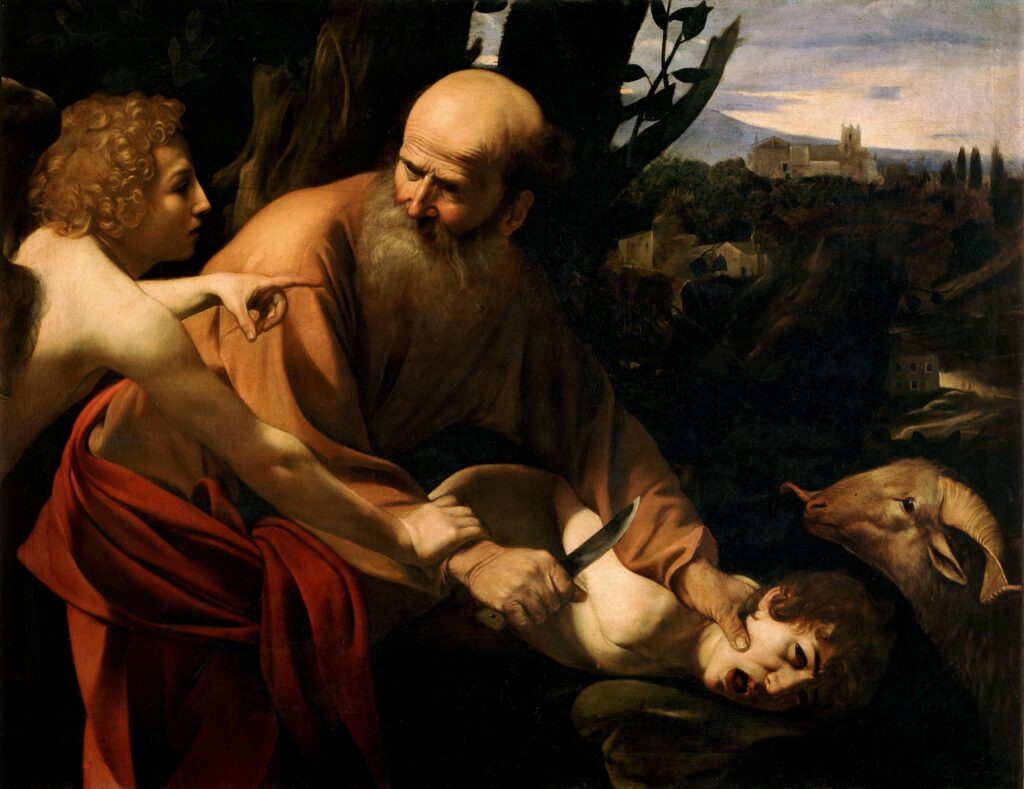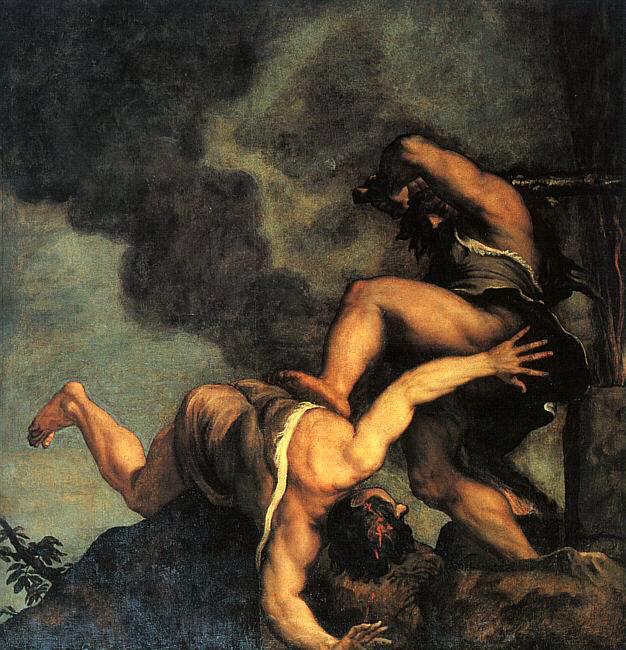The Bible speaks loudest on issues about which it is silent. One of the biggest questions that have preoccupied students of scripture is the effect of the binding of Isaac on Isaac. It’s pretty clear that although he walked out of the experience alive, something died on Mount Moriah nonetheless.

On the journey to his binding, he asks his father about the sacrificial lamb. After that question, he does not speak a word in scripture until he speaks to a foreign king in a squabble over a piece of land. A lot happens in the intervening period, not the least his mother’s death, but Isaac remains a silent participant in events around and about his life. Even when he meets his wife, Isaac utters no word. Without a doubt, something in Isaac died on Mount Moriah.
Folks have made great effort to decode the signifiers of his life. Much is written on his piety. However, his relationship with his father, his God and the world around him is haunted by a darkness that dominates his life. For much of his life, his choices, not his words speak for him. All too often, his choices are at variance with an otherwise divinely ordered plot.
Let’s start with his brother, Ishmael. After the kerfuffle between Sarah and Hagar, Abraham sends Ishmael packing with his mother. God hears the boy’s cry, an angel saves him and not much after that. Well, not really. Not if Isaac had anything to do with it. Ishmael soon resurfaces, shoulder to shoulder with Isaac, to honour the very rich father that sent him away with a loaf of bread and a jar of water!
It’s pretty clear that although Isaac walked out of the experience alive, something died on Mount Moriah nonetheless.
What has Isaac to do with Ishmael’s return? The Bible does not tell for sure. However, scripture stirs our speculation with teases that are pretty much in our faces. It’s all about a well called Beer-lahai-roi, a well so-named by Hagar, because, by that well God acknowledged her affliction.[1]Genesis 16:13-14
Initially the Bible records Isaac coming from the general area of the well to meet Rebecca, only to confirm later that Isaac made his home by that same well.[2]Genesis 24:62 Let’s put this in context. Isaac, the scion of Abraham and Sarah, the covenant progeny, leaves home and his father’s great wealth to make his home by the place that God reveals Himself to Hagar and Ishmael. Strange that St Paul missed that bit in his fantastical exegesis in Galatians.[3]Galatians 4:22-30
Whatever Sarah, and Abraham for good measure, are selling on Ishmael, Isaac does not buy it. In his own way, he heads in the opposite direction to heal a filial fracture. But this is only the beginning. Isaac is on a much bigger mission.
In a world in which fathers are gods, mothers run things and the word of God is law, Isaac chooses his own uniquely iconoclastic path. A young boy from whom much is taken on Mount Moriah grows into a man in search of redemption, a voice, relevance, an opportunity to challenge a divine prerogative and subvert the divine plan.
Isaac knows God favours Jacob the younger of his two sons to possess the mantle of Abraham. As Jacob prepares to flee from Esau, Isaac puts the Abrahamic mantle upon Jacob, confirming his knowledge of the will of God.[4]Genesis 28:3-4 However, before that episode, Isaac summons every ounce of his paternal energy to subject Jacob, along with the blessing of Abraham, to servitude under Esau. In the words of the blessing he plans to put on Esau, he says:
“Let people serve thee, and nations bow down to thee: be lord over thy brethren, and let thy mother’s sons bow down to thee: cursed be every one that curseth thee, and blessed be he that blesseth thee.”[5]Genesis 27:29
And when it dawns on him that Jacob has outwitted him, he tells Esau: “Behold, I have made him thy lord, and all his brethren have I given to him for servants; and with corn and wine have I sustained him: and what shall I do now unto thee, my son?”[6]Genesis 27:37
In a world in which fathers are gods, mothers run things and the word of God is law, Isaac chooses his own uniquely iconoclastic path.
At first reading one wonders why a father would desire that one child served the other? Why does he have only one blessing in him – after all Jacob has a blessing for each of his twelve sons and two of his grandchildren? But when read in the larger context of how his intentions might have impacted the Abrahamic mantle upon Jacob, you realise that Isaac was being subversive.
But why?
Scripture is full of tension and Isaac took the tension head-on – even when the acts of God are at the heart of the tensions.
Throughout the Hebrew scriptures, God celebrates the status of the first son. He ascribes a privilege to the first son irrespective of the family dynamic.[7]Deuteronomy 21:15-17
However, scriptures record the Almighty almost always breaching his own divine order. He prefers Abel to Cain, Isaac to Ishmael, Jacob to Esau, Moses to Aaron, Solomon to Adonijah and on and on and on! These preferences brew up noxious tension in almost all of these families. With Cain and Abel, Adonijah and Solomon, it leads to murder. Worse, in the case of Esau and Jacob, it leads to generational fratricide. The only relationship that sidesteps that tension is Isaac and Ishmael’s.
Isaac had learned from his father that one may challenge divine prerogative. The bible records Abraham challenging the divine view that denies the humanity of each soul, but views nations as blocs and people as herds![8]Genesis 18:23-25
Scripture is full of tension and Isaac took the tension head-on – even when the acts of God are at the heart of the tensions.
In much the same manner, Isaac appears to see in the testing of Abraham’s faith, a transaction that objectifies him and he protests a faith that denies him his humanity; a nascent religious culture of ‘the chosen’ and nonentities. The father is chosen and the son is pawned. He is chosen and ‘away with Ishmael. Jacob is chosen therefore, “the elder shall serve the younger”![9]Genesis 25:23 He sets out within his own home and sphere of influence to accord his firstborn the divinely mandated honour and glory, no matter the revealed, divine will.
In his desire to do right by his first son, he commits an error of Oedipean proportions! His attempt to circumnavigate the divine prerogative by bringing the Abrahamic covenant under the authority of Esau comes from a misreading of the words, revelation and ways of God. It’s a perennial misreading that’s fuelled the violence within the Abrahamic faiths, to wit, God calls one and rejects the other. Or in the words of St Paul on Isaac and Ishmael:
“Nevertheless what saith the scripture? Cast out the bondwoman and her son: for the son of the bondwoman shall not be heir with the son of the freewoman.”[10]Galatians 4:30
And on Esau and Jacob, he writes:
“For the children being not yet born, neither having done any good or evil, that the purpose of God according to election might stand, not of works, but of him that calleth;) It was said unto her, The elder shall serve the younger. As it is written, Jacob have I loved, but Esau have I hated.”[11]Romans 9:11-13
Besides these scriptures highlighting an exegetical overreach, it’s such thinking that leads Isaac to initiate a pre-emptive and superseding blessing for Esau. The result is a generational malice that leads to the prophecy of Malachi that St Paul masticates for his own purposes.
The calling of one does not infer the rejection of the other, for God hears Ishmael’s cry, even when Ishmael does not make a sound and promises to bless him because he is Abraham’s son.[12]Genesis 21:13
And the election of one need not be the subjugation of another. Scriptures show that not only does God bless Esau materially, [13]Genesis 36:6-7 He gives him his own inheritance,[14]Deuteronomy 2:5 and it is Jacob who bows to Esau, seven times.[15]Genesis 33:3
Much of the tension in scripture is caused, not so much by divine choices, but by how folks meddled with what little they knew of divine purposes. Even in our own lives, we tie ourselves up in knots because, as those looking through a glass darkly, we meddle with divine plans.
Much of the tension in scripture is caused, not so much by divine choices, but by how folks meddled with what little they knew of divine purposes.
Folks bring to their study of scripture the sort of baggage Isaac brings into the reading of God’s plan for his family. And our misreading invariably brings religious and cultural tensions within homes and between faiths.
For every soul God has a plan. The revelation we are given is not the totality of all there could be known. Behind every relationship between heaven and earth and at the core of every Abrahamic faith is a revelation and a covenant to which all are not partakers, only those who are tied to a specific calling and purpose under such a covenant. As Moses said:
“The secret things belong unto the LORD our God: but those things which are revealed belong unto us and to our children for ever, that we may do all the words of this law.” [16]Deuteronomy 29:29
That the covenant at Sinai was for the congregation of Jacob did not infer that non-Jews were rejected or ‘without a God in the world‘[17]Ephesians 2:12. God who makes a covenant with the day and the night would not commit the rest of humanity that He made in His own image to irrelevance. The tendency to want to establish and enforce one’s own relevance is a relic of Isaac’s discontent, and it’s the spring of much antipathy between people and faiths all over the world.
References
| ↑1 | Genesis 16:13-14 |
|---|---|
| ↑2 | Genesis 24:62 |
| ↑3 | Galatians 4:22-30 |
| ↑4 | Genesis 28:3-4 |
| ↑5 | Genesis 27:29 |
| ↑6 | Genesis 27:37 |
| ↑7 | Deuteronomy 21:15-17 |
| ↑8 | Genesis 18:23-25 |
| ↑9 | Genesis 25:23 |
| ↑10 | Galatians 4:30 |
| ↑11 | Romans 9:11-13 |
| ↑12 | Genesis 21:13 |
| ↑13 | Genesis 36:6-7 |
| ↑14 | Deuteronomy 2:5 |
| ↑15 | Genesis 33:3 |
| ↑16 | Deuteronomy 29:29 |
| ↑17 | Ephesians 2:12 |


